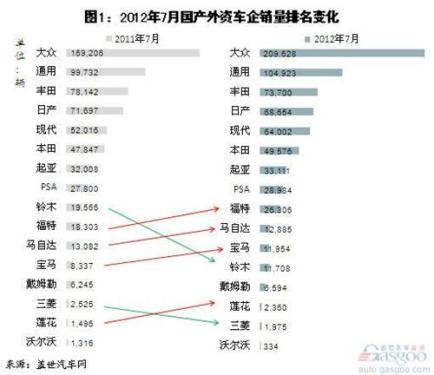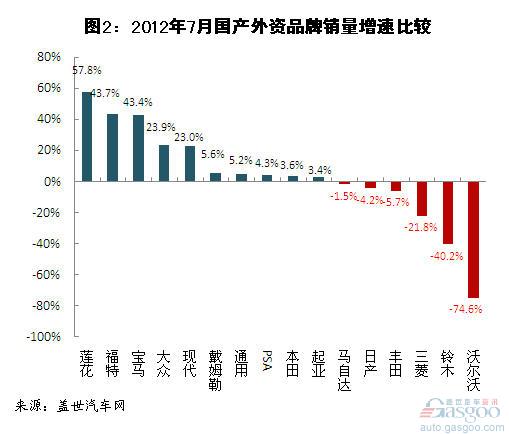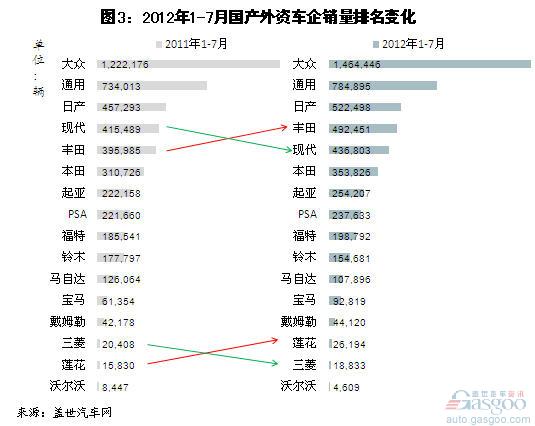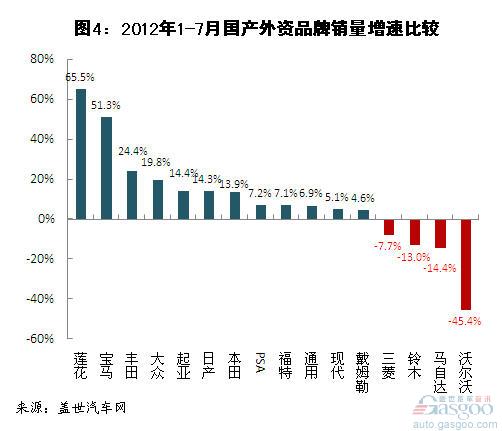 In July, the sales growth of foreign-invested passenger cars was lower than that of their own brands for the first time in the year. According to the data compiled by Gasgoo.com, from January to July this year, the sales volume of 16 domestic foreign-invested companies (excluding microbuses, the same below) totaled 519.47 million. Vehicles, an increase of 12.5% ​​year-on-year, higher than the domestic passenger car market average (8.4%); and from a single month point of view, its sales increased by 8.8% year-on-year to 70.67 million units in July, an increase lower than the market average (10.5 %), which was also the first time in the year that the growth rate was lower than the self-owned brand (14.9%).
In July, the sales growth of foreign-invested passenger cars was lower than that of their own brands for the first time in the year. According to the data compiled by Gasgoo.com, from January to July this year, the sales volume of 16 domestic foreign-invested companies (excluding microbuses, the same below) totaled 519.47 million. Vehicles, an increase of 12.5% ​​year-on-year, higher than the domestic passenger car market average (8.4%); and from a single month point of view, its sales increased by 8.8% year-on-year to 70.67 million units in July, an increase lower than the market average (10.5 %), which was also the first time in the year that the growth rate was lower than the self-owned brand (14.9%). July: BMW, Ford show high-growth Japanese Honda sales growth alone From a single month point of view, 16 domestic foreign-funded passenger car companies ranked Volkswagen, GM, Toyota, Nissan, Hyundai, Honda, Kia, PSA, followed by high and low sales. Ford, Mazda, BMW, Suzuki, Daimler (including Beijing Benz and Fujian Daimler), Lotus, Mitsubishi and Volvo. Compared with the same period of last year, the main changes in the ranking were: Suzuki was overtaken by Ford, Mazda and BMW, ranking from ninth to twelfth; Lotus exceeded Mitsubishi and ranked 14th.
From the perspective of sales growth, Lotus has the fastest growth. In July of this year, sales increased by 57.8% to 2,360 units, but sales are still low. Followed by Ford and BMW, Ford's sales increased by 43.7% from the 18,300 units in the same period last year to 26,300 units. The high sales growth was mainly due to the high growth of Mondeo's winning and the sales of New Fox listed. Among Ford’s models, Mondeo won 62.9% to 4730. The new Fox hatchback and sedan that were launched in April this year had 5,234 units and 5,887 units respectively. Older Fox hatchbacks, sedan and carnival sales all appeared. A sharp decline.

BMW's sales increased by 43.4% year-on-year to 12,000 units, making it the fastest growing of the three major luxury brands. Its high growth was mainly due to the high growth of the BMW 5 Series and the new BMW X1. In July of this year, sales of the BMW 5 Series increased by nearly 80% to 8,765 units; sales of the BMW X1 (domestic listed in March this year) also had 2,303 units; while sales of the 3 Series decreased by 74.3% to 886 units.
Compared with the BMW brand, Audi and Mercedes increased at a lower rate. Audi sales increased 12.1% to 26.60 million units in July; Mercedes-Benz sales (referred to as Beijing Benz sales) only increased 5.6% to 6,594 units.
Popular and modern sales have also grown faster. Volkswagen’s July sales increased by 23.9% to 209,600 units. Among its main models, Langyi, Sagitar and Magotan all showed high growth. Modern sales of 64,400 vehicles, an increase of 23% over the same period last year, its main models Sonata 8 generations, Rena, Elantra Yuet move and Tucson all achieved rapid growth.
Of the six Japanese car companies, sales of other companies declined except Honda's sales growth of 3.6%. The main reason is related to the fact that its sales volume recovered rapidly from the earthquake in Japan in July last year and the sales base is relatively large. Among them, Suzuki had the highest decline, down 40% year-on-year to 11.7 million units; followed by Mitsubishi, which also saw a 21.8% decline in sales; sales of Nissan, Toyota and Mazda all declined slightly from the same period last year.
In addition, sales of GM, Kia, PSA, and Daimler both increased by single digits. Among them, GM sales rose 5.2% to 104,900 units, and its "Double-jun" still performed poorly in the B-class market.
Volvo sales fell 74.6% in July this year, only 334.

January-July: Toyota exceeded modern FAW-Volkswagen to surpass Shanghai Volkswagen From January to July this year, 16 domestic foreign-funded passenger car companies ranked according to their sales volume in line with the first half of the year, followed by Volkswagen, GM, Nissan, Toyota, and Hyundai. , Honda, Kia, PSA, Ford, Suzuki, Mazda, BMW, Daimler, Lotus, Mitsubishi and Volvo. Compared with the same period of last year, the main changes were: Toyota overtook Hyundai and ranked one to fourth; Lotus exceeded Mitsubishi and ranked 14th.

From the perspective of sales growth, from January to July this year, the performance of domestic foreign-owned brands was similar to that of the first half of the year (see: Analysis of Sales of Foreign-invested Passenger Vehicles in the First Half of 2012): 1. The fastest-growing sales volume is Lotus and BMW, with a growth of over 50%, 2. Japanese cars, Japan’s “big three†companies (Toyota, Nissan, and Honda) all showed sales growth, while sales of “Three Littles†(Suzuki, Mazda, and Mitsubishi) are both declining. 3, Volkswagen and Kia are also growing in double digits; 4, Volvo sales have the highest decline.
In addition, it is worth mentioning that among Volkswagen's two joint ventures in China, FAW-Volkswagen's sales volume in the first half of this year is still lower than Shanghai Volkswagen. From January to July this year, FAW-Volkswagen sales totaled 733,700, which exceeded Shanghai Volkswagen. 73.08 million).
Note:
1. All the sales in this article refer to the wholesale sales of domestic foreign-owned brands of narrow-minded passenger cars (sedans, SUVs, and MPVs) by foreign-invested car manufacturers.
2. The concept of Guangzhou Automobile Honda S1 is a joint venture independent brand and is not within the scope of the “foreign brand†referred to in this article. Similarly, SAIC-GM-Wuling's Baojun 630, Wuling brand microbus, Dongfeng Nissan Kaichen D50 and Dongfeng Honda Siming have not been included in the statistics.
3. All exports of Jazz produced by Honda (China) are not included in the Honda sales described in this article.
vacuum formed trays is one of plastic trays which produced by thermoforming process. Frist step is heating a sheet of plastic then plastic sheet was stretched over a mold over a mold before being forced against it by a vacuum,the plastic tray is manufactured.
Diffirence with standard plastic trays with fixed cavities, the benefites of using vacuum formed trays comes from customized options avaiable.With advantage of lightweight, easy to operation, saving space,welcomed by most of customer.
vacuum formed trays can effective protect your parts or components.They are wide used on packaging trays,lastic tooling trays, precision device trays, medical trays, cosmetic trays, pet product trays, hydroponic planting trays, transportation trays, automotive parts trays etc.
Vacuum Formed Trays,Vacuum Forming Plastic Trays,Thermoforming Plastic Trays,Thermoforming Trays,Vacuum Formed Packaging Trays
Dongguan Yiyongli Industrial Co.,Ltd. , https://www.absthermoforming.com